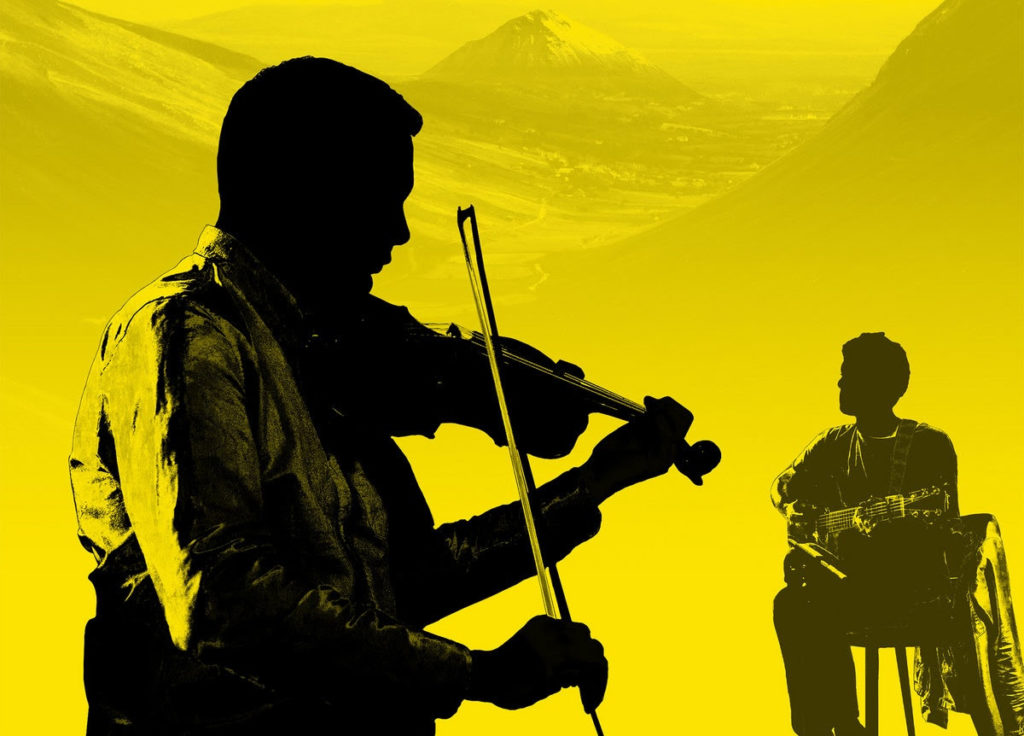AN IRISH traditional music expert once scathingly dismissed Donegal music by describing it as not only Scottish music, but bad Scottish music.
Ciarán Ó Maonaigh’s new solo album, Lost in the Music/Caillte sa Cheol, demolishes that view — if it even continues to be held anywhere.
With the success of Altan, Clannad and Tommy Peoples and Paddy Glackin, the fiddlers with The Bothy Band, it’s difficult to see how anyone could disparage the music from this corner of Ulster.
Donegal fiddling — Donegal traditional music — has of course been influenced by Scottish music, as has the whole of traditional music in Ireland, although much less so the further south you go.
The converse is also true: Irish music has hugely influenced Scottish music, and of course this is exactly as you would expect with two Celtic countries so close to each other — at their nearest points there is only eleven miles of sea separating the two areas, and migration between the two islands has long been a part of the fabric of the society.
However, Comhaltas Ceoltóirí Éireann — a body which has done an incalculable service in preserving and fostering Irish music — was once subject to regular bouts of what more or less amounted to xenophobia; although to be fair, sometimes with good reason, when the music was struggling to recover from all types of opposition.
 Ciarán Ó Maonaigh’s new album, Lost in the Music/Caillte sa Cheol, continues his focus on Donegal’s fiddle tradition
Ciarán Ó Maonaigh’s new album, Lost in the Music/Caillte sa Cheol, continues his focus on Donegal’s fiddle traditionAs Irish music came to be codified under CCE from the 1960s onward, the organisation often favoured a southern Irish style in its structured sessions and competitions. This sometimes conflicted with regional traditions like Donegal’s, which drew heavily on its Scottish-influenced repertoire.
This included using lower strings as drone notes — echoing the drone note on the bagpipes; the Scottish ‘snap’ (a short, accented note followed by a longer one); and the use of double stops — that is, playing two-note chords on the fiddle. The Donegal style, like much of Scottish fiddling, is an energetic style, often using a ‘short’ bow.
The Donegal tradition, shaped by close geographical ties with Scotland and the Ulster-Scots, includes many tunes such as the ‘highlands’ (similar to the Scottish strathspeys), with Scottish origins — although perhaps originating in the first place in Ireland. But at formal Comhaltas sessions, such music was sometimes disparaged as un-Irish and much frowned upon.
Donegal musicians, including respected players, reportedly faced antagonism when bringing their repertoire to Comhaltas venues — highlighting a deliberate suppression of their distinct style. This was a move strenuously resisted in Donegal where the playing of 'highlands' is still one of the glories of the tradition.
Ciarán Ó Maonaigh’s new solo album, Lost in the Music/Caillte sa Cheol, continues his focus on Donegal’s fiddle tradition. Joined by guitarist and co-producer Seán Óg Graham, Ó Maonaigh explores both archival material and personal interpretation, blending tradition with innovation.
Ó Maonaigh, grandson of Francie Mooney and nephew of Mairéad Ní Mhaonaigh of Altan, has long been immersed in the Donegal style. This second solo release follows his 2004 album Ceol a’ Ghleanna, and showcases his maturing voice.
From the outset, the album pays tribute to legends like Tommy Peoples, John Doherty, and Néilidh Boyle. The opening set of reels includes layered fiddle lines and rhythmic foot percussion from his wife and musical partner Caitlín Nic Gabhann, evoking the energy of classic Donegal duets.
Throughout the album, Ó Maonaigh balances fidelity to source material with inventive arrangements. In tracks like The Rakes of Clonmel and Nóra Críonna, he captures the piping influence in Donegal fiddle through ornamentation and bowing technique. Guitar accompaniments, especially in The Repeal of the Union, build a dynamic texture reminiscent of the Bothy Band’s signature sound.
A few tracks veer into more experimental territory. Graham’s use of layered guitar and synths on Elizabeth Kelly’s and Palm Sunday adds a new atmosphere, though some listeners may find the production less in keeping with the rest of the album’s traditional tone.
In contrast, the high-octane sets Creamers/Píobaire an Chéididh and The Blackberry Blossom/Kitty Gone a Milking showcase tight ensemble interplay and sharp rhythmic lift.
New compositions round out the album. Ó Maonaigh contributes Rosie from Donegal, while Caitlín Nic Gabhann’s St. Brigid’s Day and Liam O’Connor’s strathspey Frankie’s Frolics highlight a living, evolving tradition. Ó Maonaigh also tackles technically demanding pieces like Mamore Gap and hornpipes drawn from Seán Maguire and John Doherty.
The closing track, a live recording of Kitty O’Neill’s Champion Jig, connects back to Tommy Peoples and reflects the Donegal flair for reinvention. With piano from Liam Ó Maonlaí, the track ties together the themes of homage and personal style that run through the album.
This confident, thoughtful release confirms Ó Maonaigh’s standing as both tradition-bearer and innovator, offering a rich listening experience and a blueprint for the next generation of Donegal fiddlers.
Available on Bandcamp: https://caitlinciaran.bandcamp.com

